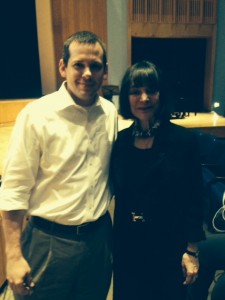One of my favorite reads of the last few years is Mindset: The New Psychology of Success by Dr. Carol Dweck. Like the work of John Hattie and his compilation of research in Visible Learning the work of Carol Dweck has been a professional subject of learning and study for me. Dr. Dweck is the Lewis and Virginia Eaton Professor of Psychology at Stanford University and is a leading researcher in the areas of developmental psychology, social psychology, and personality. What is fascinating to me about her research is that her findings on student achievement, growth, and motivation are contrary to what is commonly believed. In this post I will give a very basic explanation but more importantly share with you some excellent resources that speak with far more eloquence on this topic than I do.

Carol Dweck and myself in Evanston earlier this year.
Dr. Dweck’s research shows that individuals have two possible mindsets. The first is a fixed mindset where you believe or are led to believe that your qualities such as intelligence are set or fixed. The second mindset is the growth mindset that is based on the belief that your qualities are able to be cultivated through effort. The idea that hard work and effort pay off is not ground breaking. But what is interesting is that for a long time we have thought of qualities like intelligence as fixed. Dr. Dweck’s research finds exactly the opposite. Intelligence is also a characteristic that can be developed with the proper mindset.
So how do we foster a growth mindset? It turns out the easiest way is in our everyday language and praise. Dweck’s research says to focus praise on the process and on qualities such as effort rather than outcomes. We often rush to tell students how “smart” they are when they get a good grade on a test yet we rarely think of what message that sends them when they come to something truly challenging and are not successful the first time. What we want is for the student to persevere in that moment and continue trying until they achieve success. The hard part is that many students have learned to see effort as something that reflects on their intelligence in a negative way. They think that if they have to put in a lot of effort then that must mean they are not smart. Nothing could be further from the truth. The more we can get students to focus on growth and embrace the process and challenge, rather than just the outcome, the more they will achieve. Here is a great cover story from New York Magazine that goes into this in much more depth. The Inverse Power of Praise
Another researcher that has done a lot of great work on mindset and effort is Angela Lee Duckworth from the University of Pennsylvania. Her research and findings on what she terms “grit” are very interesting. Here is her TED talk on GRIT.
We are passionate at Kipling school in trying to help students develop a growth mindset. We want our students to persevere when things get challenging and reach their full potential. The picture below is from our own Mr. Schwartz. This is a bulletin board he has put up in his music room that helps students see how to think with a growth mindset.

Any chance of finding an alternate host for the video? The original video has been removed by the user.
Great post!